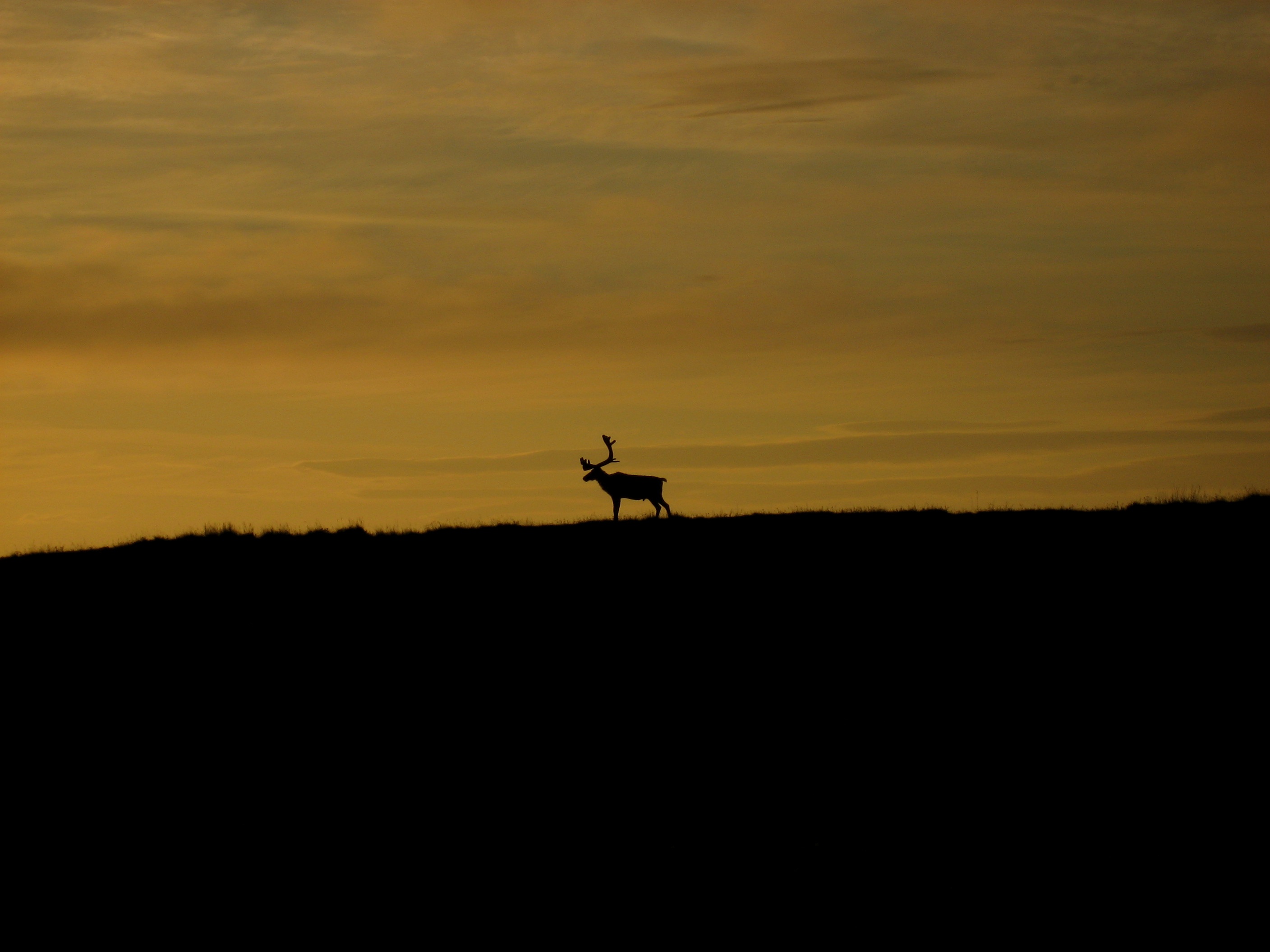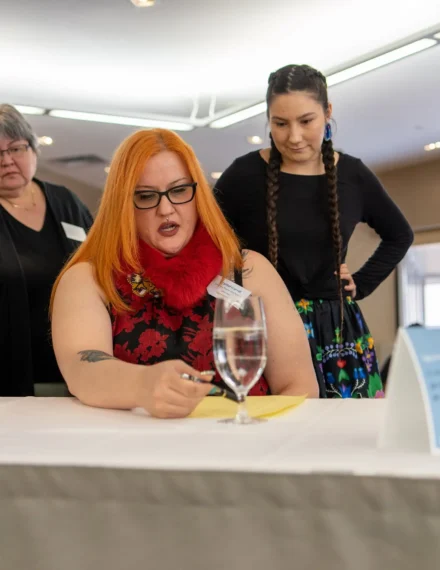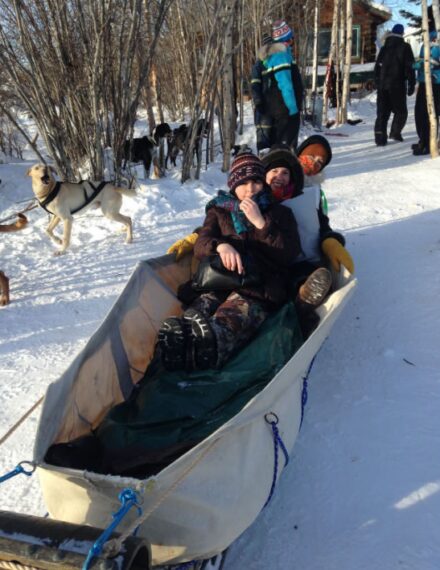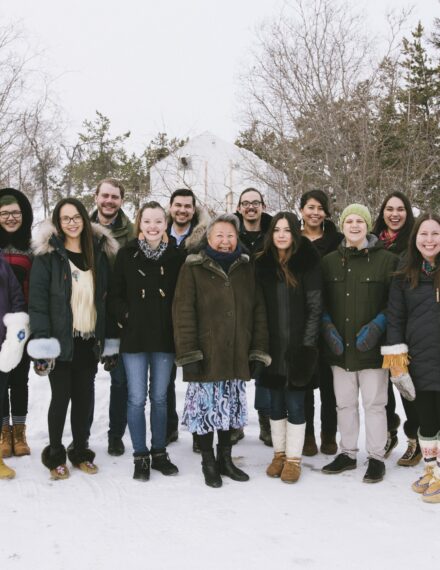
Jocelyn Joe-Strack is a Champagne and Aishihik First Nations scientist. During February 2019, she embarked on a speaking tour of Canadian embassies in Europe to sharing her Indigenous perspective on Climate Change with senior diplomats, academics, youth and the public. She is a 2012 Alumna of the Jane Glassco Northern Fellowship program.
*Featured image: Sami Keinänen via Flickr.
Our visit to Stockholm was short and enjoyable. It is much like a Canadian city – busy, vibrant, full of familiar and novel shops, candy and chocolate. After spending time in southern Europe, it was comforting for our family to put on our coats and see ice amongst the pine trees.
My girl said: “This is spring for us, eh?”
“Yes baby, like spring. It’s still winter at home,” I responded.

While in Stockholm, I had a pleasure of presenting at the Conference on Climate Change hosted by the Embassy of Canada to Sweden. My co-presenters were Niila Inga, Chair of the Swedish Sámi Riksförbund and Lars Ronnås, the Swedish Ambassador for Climate Change.
I opened by sharing my perspective on shifting humanity back to wellness through reconciliation as a means return to harmony with Earth. Lars Ronnås followed with a pragmatic presentation about the political and legislative realities of how climate change is being approached through various international agreements.
I was happy to learn that, through progressive programs and policies, Sweden has managed to reduce their emissions by 23% while at the same time increasing their GDP by 58% (from 1990 to 2013). Prior to our meeting, I read that cities produce 70% of emissions as well as 80% of GDP. I was hopeful to hear of Sweden’s success in uncoupling the two. They claim their success is based on green energy, a carbon tax and transit.
Niila Inga ended our conference with a moving, personal account of Sámi hardship in their care of the reindeer. The Sámi are the Indigenous people of the European north. Their territory encompasses large parts of Norway, Sweden, Finland and extends into Russia. They’re identity is linked to reindeer; whose migration they follow from summer to winter grounds.
Historically, the Sámi rarely had to herd reindeer. However, in recent years, the lichen the reindeer feed on has become inaccessible due to winter temperature fluctuations resulting in it being covered with ice rather than snow. To supplement their diet, Sámi corral the reindeer and feed them hay and pellets. This diet is hard on their digestive systems and being fenced goes against the herd’s instinct to roam.
“The reindeer are sad”, Niila shared. The Sámi have Indigenous rights to live their lifestyle as reindeer herders, however, prior to development, the animals were free to move as needed. If the ground was frozen, perhaps they would have travelled south.
Today, the Sámi have allocated grazing lands, bordered by lines on a map that the reindeer know nothing of. The Sámi and the reindeer survived immemorially. But now, because of a theoretical line, animals and people are suffering.
The Sámi are still fighting for their way of life. They are continuing to increase their capacity to advocate for their traditional rights in a modern society of emails and policies. But they struggle to be heard and meaningfully consulted as ever-growing development fragments their comparatively small tract of land.
Learning about the Sámi’s situation, I realized that I take my Nations’ Final Agreements for granted. My people have advanced self-determination. We expect and direct how development occurs. We no longer have to put all our energy towards ensuring our voices are heard.
It is amazing what empowerment of a once oppressed people can mean. In the Yukon, it has meant a dramatic shift in how the territory is governed and how the people view and honour Indigenous ways. Our consent is a must. We, and all Yukoners, are actively seeking to understand how to wield the advantage of our ways. I believe the Yukon is much better for it.
An example of this was the Supreme Court decision in favour of Yukon First Nations regarding Land Use Planning in the Peel River Watershed.
The more I consider it, the more I recognize how important self-determination is in the evolution of Earth’s societies. But I also consider what self-determination meant for my First Nation and what we had to give up.
After Stockholm, I travelled to Berlin and spent an afternoon in Potsdam where I met with researchers from the Alfred Wegner Institute at the Universität Potsdam. During our networking, I was challenged to ponder the intersection between Indigenous and scientific knowledge. This is a narrative that has received much attention and publication. Globally, many researchers are working to ensure their projects involve and reflect the knowledge of local Indigenous people.
During our conversation I said: “To achieve our agreements, we had to learn how to work in paper, we became lawyers, academics and bureaucrats, and we are very good at it. But in putting all our energy into negotiating and implementing our Agreements and Governments, we moved further away from our inherent connection with Earth.”
I then had to pause. The burden of how much our people gave up so I could stand in this room and talk as an Indigenous scientist with German scientists weighed upon me. In fighting for our self-determination, we further adopted western practices and became less dependent on our cultural ways.
In Together Today for Our Children Tomorrow, the vision is one where we walked with confidence in both cultures. Only now, as our Nations’ provide our own programming through our own modern governments, are we beginning to fully reclaim our culture. Next, we will put efforts into evolving our governments to better reflect Dänk’e (our way) and our needs.
It made me think about today’s efforts to help oppressed and healing Indigenous groups. This made my head start to hurt.
Academics are making leaps and bounds in how they approach research “with” instead of “on” Indigenous communities. Still, the questions scientists pose often do not align with the aspirations and needs of Indigenous people.
For Indigenous people still experiencing the hurt and hardship of colonization, it can be an endeavour just to articulate what we need in order to heal. So, I find myself contemplating, what is it that we are working towards?
My default answer is that we are continuing to reclaim our identity as a strong, rooted Dän (people) who are confident in our language, culture and duty to care for the land. We are actively trying to evolve our societies to benefit from the advancements of modern civilizations while empowering the lessons of our ancestors.
That does not mean we are attempting to go back and live as our ancestors did. We are moving forward with, I hope, the best of our culture and the modern culture we have adapted.
But what does that mean for Earth? And what does that mean for Indigenous people still fighting for their autonomy? Or even for developing countries who are seeking modern conveniences and security?
I feel it comes again to the question of: “What is Prosperity to a generation who lives in harmony with Earth?” Are we happy? I wonder what the outcome would have been if were able to negotiate our agreements in our Dän way? I am contemplating where this harmonious place is that I envision for my grandchildren, between Indigenous and modern society.
I suppose this is why I find it so challenging to again discuss with researchers the meeting of Indigenous and modern ways of knowing. Sometimes I’m not sure if it exists.
For our people, we had to shelve our culture in order to negotiate and today we are having to work very hard to dust ourselves off and reclaim how to walk tall in the forest. A people should never have to do this in order to communicate and have the wisdom of their way reflected.
Stay tuned, I am preparing to go march with Europe’s youth in their fight against government approaches to Climate Change. More thoughts to come.
Jocelyn Joe-Strack is a Champagne and Aishihik First Nations scientist. She is a 2012 Alumna of the Jane Glassco Northern Fellowship program.
During February 2019, she embarked on a speaking tour of Canadian embassies in Europe to share her Indigenous perspective on climate change with senior diplomats, academics, youth and the public. You can follow her travels her, on Twitter @GlasscoFellows or @jocelynjs or by subscribing to The Gordon Foundation newsletter for updates.
Blog 1: An Invitation To Europe
Blog 3: Taking Time To Reflect
Blog 4: Reflections from Picasso
Blog 5: Indigenous reconciliation
Blog 6: Science, Reindeer & Knowledge
Blog 7: Youth Wisdom & Inspiration


